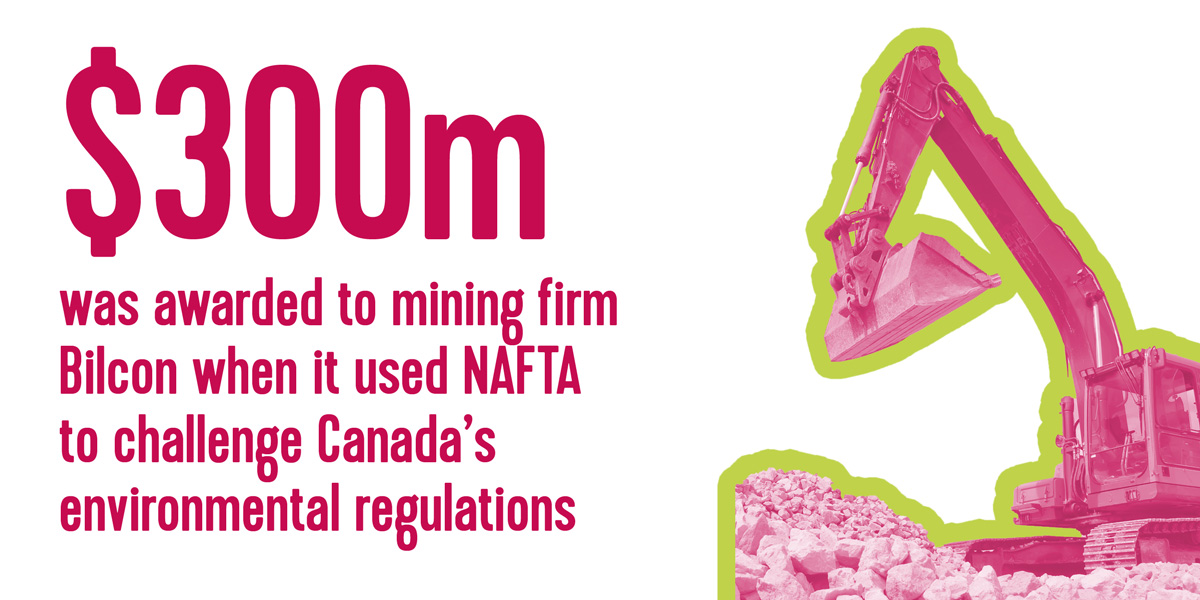6. Climate change

“Universal tariff
reduction has increased trade in carbon‑ intensive and environmentally destructive products, such as
fossil fuels and timber, more than it has for environmental goods. In some cases FTAs [free trade
agreements] can also shrink the ‘policy space’ available to countries to pursue environmental goals, for
example if they prohibit, or are perceived to prohibit, a country’s ability to distinguish between
products according to emissions released during their production.”
The Economist
Intelligence Unit80
We are living through a climate emergency. If we don’t get a grip on this crisis, our future on this planet is in jeopardy. But this is not simply a question of individuals changing their lifestyle. Climate change is driven onwards by the rules of the global economy. Trade rules and trade deals have played a significant role in exacerbating this crisis.
At one level, the very nature of trade liberalisation is problematic. The production and transportation of goods is largely dependent on fossil fuels. Promoting the movement of more and more goods around the world means environmental destruction. It exacerbates the extraction and burning of fossil fuels on an unprecedented scale.
If we took a fundamentally different approach to trade deals, then trade could help disperse renewable technologies and more carbon-efficient production methods – but at present trade rules actually ban many measures to encourage the spread of green technologies.
We also need to keep in mind that renewable technologies in themselves can only do so much. A totally renewable economy based on never‑ending growth would still quickly exhaust the world’s metals and minerals, and exacerbate global inequalities. Replacing every petrol car on the planet with an electric car would not in itself create a sustainable or fair global economy. The only answer is to fundamentally rethink our economies, including trade liberalisation as embedded in deals like that proposed between Britain and the United States.
In reality, there is a high likelihood that any trade deal with the US would increase carbon emissions. Britain admits to this possibility in its scoping paper and names energy as one of the likely ‘growth sectors’ under a deal.81 When the EU was negotiating a trade deal with the US (the now‑shelved TTIP), it predicted an additional 11 million metric tons per year of CO2 as a consequence of that agreement.82 Damage to the environment is hard‑wired into the current trade system. The idea that trade liberalisation is a solution to climate change is very wide of the mark.
A US deal would exacerbate the climate emergency
A trade deal with a climate‑denying leader like Donald Trump clearly posed a very specific and urgent challenge for Britain’s attempt to radically reduce carbon emissions. That’s why Labour’s shadow foreign secretary Lisa Nandy MP urged the government not to sign a trade deal with any country that refuses to abide by climate change obligations agreed to under the UN Paris agreement.83
A trade deal with Joe Biden could well be different in this respect, and is much more likely to mention climate change – perhaps even adopting some sort of ‘sustainability chapter’. But we shouldn’t be fooled into thinking this will solve all the problems. Sustainability chapters are often weak and unenforceable. The language might sound nice, but they are no match for the damage which trade deals can have on carbon emissions.
There are some specific elements of a US deal which would cause particular problems:
- Actively encouraging trade in dirty fossil fuels. This is notable in recent deals the US has done. The renegotiated NAFTA agreement between the US, Canada and Mexico (USMCA) makes it cheaper for oil corporations to export more Canadian tar sands oil. The US‑China ‘phase one’ deal requires China to import fossil fuels. What’s more, Canada used the negotiations for the EU‑Canada trade deal CETA to insist that the EU should import more tar sands oil, overriding a regulation that would have prevented that.84
- Energy ‘neutrality’. Even when a trade deal does not specifically promote fossil fuel trade, so‑called ‘energy neutrality’ clauses stop countries from treating fossil fuel energy differently to energy from renewable sources. That means, for example, it would not be possible to charge lower tariffs on renewable energy or punitive ones on fossil fuels. The leaked energy chapter of TTIP had this rule.
- Promoting voluntary action over binding regulation. To tackle the climate crisis, we need strong binding regulation that can shift us out of decades of inertia and business‑as‑usual. Yet trade rules are written to prioritise voluntary self‑regulation by corporations – exactly the approach that has resulted in continued inaction. The US has emphasised that it wants an approach that always prefers self‑regulation.
- Regulatory harmonisation. We’ve already seen how modern trade deals can exert downward pressure on regulations and standards when it comes to food. The way we produce our food also has a very big impact on climate change. The increasing trend towards industrial‑style food production is a major driver of climate change, involving more animals, more chemicals, more monocrop plantations. Given that emissions from agriculture are thought to account for between 19% and 29% of total emissions, this has a significant impact.85 Changing the food we eat further in this direction will hamper our ability to halt climate change. Recent reports also show how big business is trying to use existing and proposed US trade deals to challenge Canada’s attempts to reduce plastic use86, and roll back Kenya’s 2017 ban on plastic bags and force the country to continue importing waste plastics from the US.87
- A corporate court. The ISDS system (see chapter 4) has been repeatedly used to challenge environmental standards and protections. Canada has been a particular target, for instance being challenged under NAFTA for trying to take dangerous chemicals out of petrol, and for placing a moratorium on fracking while assessing its safety. In 2008, a corporation called Bilcon brought a case against Canada after the government refused to grant an extension to a quarry project after an environmental review found that it would cause significant damage.88 Bilcon claimed $300million and went so far as arguing that Canada should never have carried out a review. Although Bilcon won, one arbitrator disagreed with the finding, stating: “a chill will be imposed on environmental review panels which will be concerned not to give too much weight to socio‑economic considerations or other considerations of the human environment in case the result is a claim for damages under NAFTA.” The ruling was, he said, a “significant intrusion into domestic jurisdiction”. More recently, corporations have even started challenging governments for phasing out coal power in line with their international climate obligations.89
What the trade papers say
The leaked papers from the US talks show how US negotiators told Britain that it’s not even possible to mention climate change during the talks, and that it won’t be mentioned in the final deal:
“US [negotiators] responded emphatically that climate change is the most political (sensitive) question for the US, stating it is a ‘lightning rod issue’, mentioning that as of 2015, USTR [the trade representative’s office] are bound by Congress not to include mention of greenhouse gas emission reductions in trade agreements. US stated this ban would not be lifted anytime soon.”
While this reflects Trump-era concerns, it remains to be seen whether Biden will renegotiate climate-related aspects of the deal. And even if he proposed more climate-friendly language, it seems extremely unlikely that any changes would be adequate to remove the serious obstacles to climate action outlined above.
Unsurprisingly, the UK’s own assessment hedges its bets on whether the deal will increase carbon emissions, essentially saying it’s impossible to know, but certainly thinks there’s a good chance that it “could favour UK sectors which are currently more emission intensive”.
References
-
Climate change and trade agreements: Friends or foes?, The Economist Intelligence Unit, 2019
-
See note 2
-
‘Impact Assessment Report on the Future of EU-US Trade Relations’, Section 5.8.2, p.49, European Commission, March 2013
-
‘Labour leadership: Lisa Nandy says UK should refuse US trade deal if Trump quits Paris climate accord’, Independent, 15 Jan 2020
-
‘EU opens door to Canada’s dirty oil’, EURACTIV, 11 May 2017
-
Silent But Deadly: Estimating the real climate impact of agribusiness corporations, Global Justice Now, Dec 2015
-
‘U.S. companies threaten to use CUSMA to fight Canada's plastics ban, Canada’s National Observer, 6 Nov 2020
-
‘Multinational corporations already using new NAFTA to block action on plastics’, Sharon Treat and Stuart Trew, 20 October 2020
-
‘Clayton/Bilcon v. Canada’, UNCTAD Investment Dispute Settlement Navigator
-
‘Dutch Lawmakers Under Pressure Over Coal Phase-Out’, Forbes, 2 Dec 2019






